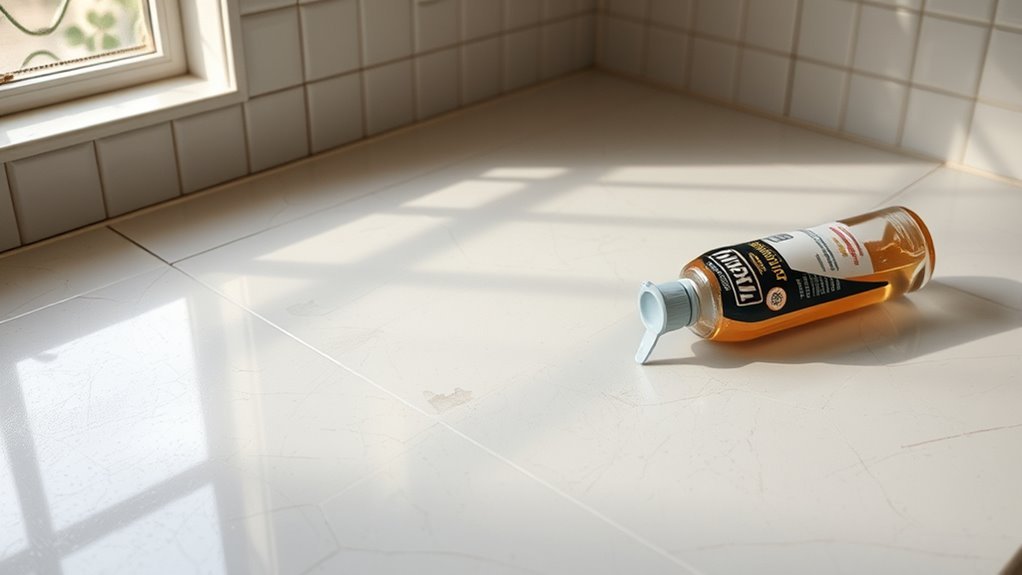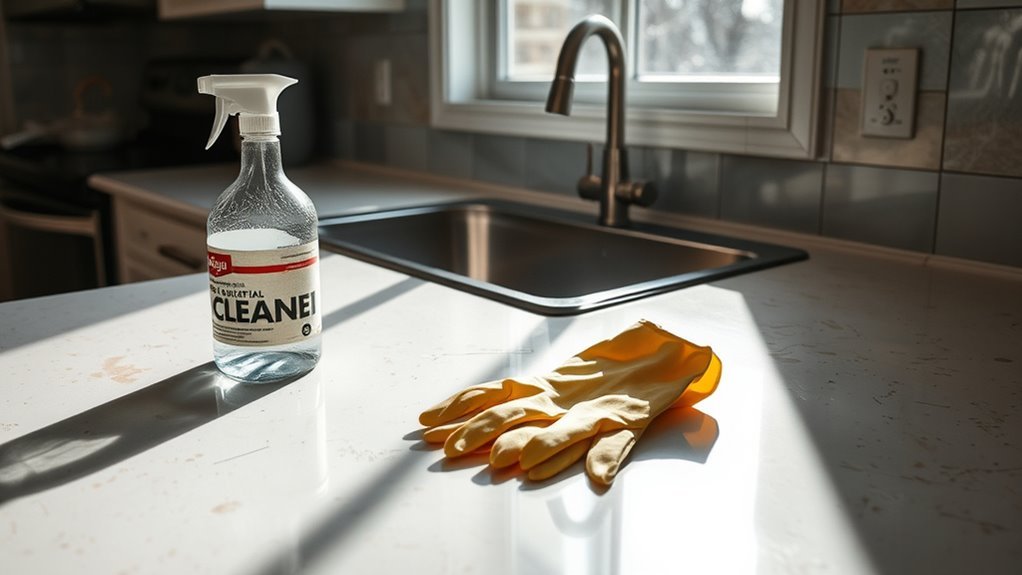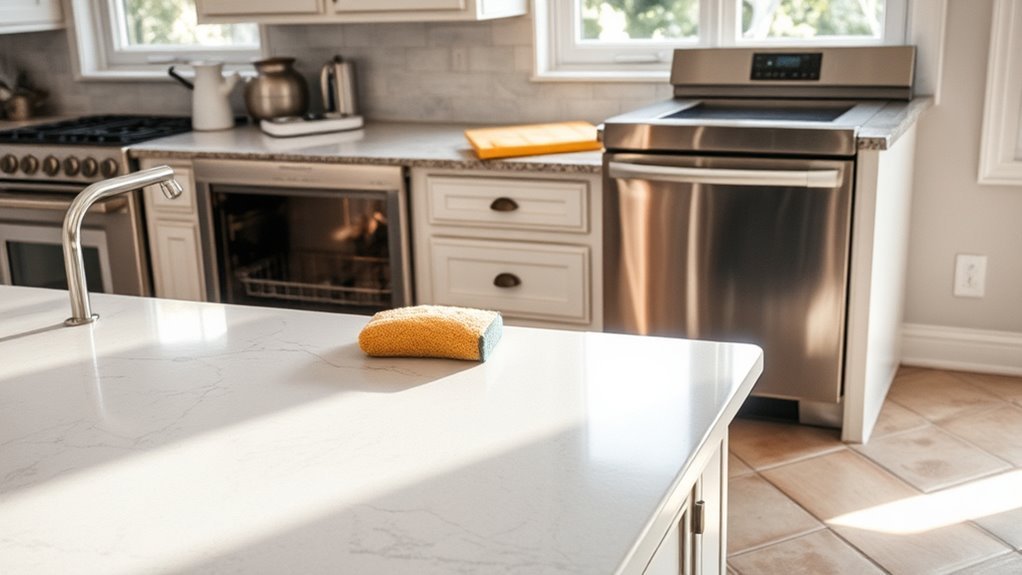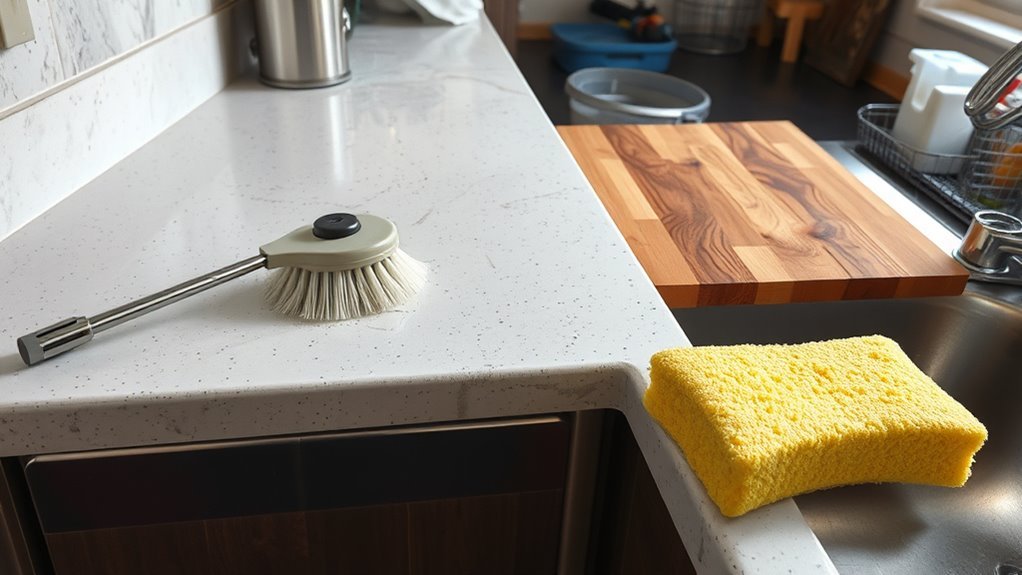Cleaning Mistakes That Damage Your Kitchen
You’re damaging your kitchen if you use abrasive cleaners on delicate surfaces or scrub with the wrong tools, which cause scratches and dull finishes. Letting spills sit instead of wiping them up quickly leads to stains and damage. Overusing harsh chemicals can harm your surfaces and your health, and ignoring appliance upkeep shortens their lifespan. Making these common mistakes adds wear and stress, but there are easy ways to protect your kitchen’s beauty and function that you’ll want to discover.
Using Abrasive Cleaners on Delicate Surfaces

Although abrasive cleaners might seem effective, using them on delicate surfaces can cause scratches and damage that’s hard to fix. You want your kitchen to look great without sacrificing the freedom to clean efficiently. Abrasive materials, like scouring pads or harsh powders, can wear down finishes on countertops, glass, or stainless steel. To avoid this, always check surface compatibility before choosing a cleaner. Delicate surfaces need gentle products that clean without scratching or dulling. By selecting cleaners that respect the material’s sensitivity, you preserve both beauty and function. Remember, a little care goes a long way in maintaining your kitchen’s freedom from damage, letting you enjoy a clean space without worrying about costly repairs or replacements.
Neglecting to Wipe Spills Immediately
If you don’t wipe spills immediately, they can quickly turn into stubborn stains or cause damage to your kitchen surfaces. Taking a moment to clean up right away not only protects your countertops but also keeps your kitchen looking fresh and inviting. Embracing spill prevention as part of your kitchen routine creates a smoother workflow and less stress. When you organize your kitchen efficiently—placing cleaning supplies within easy reach—you’ll find it easier to tackle messes as they happen. This simple habit saves you time and effort later, preventing sticky residues or discoloration. Remember, staying proactive about spills means maintaining a healthier, more beautiful kitchen. Don’t let small messes pile up; you’ll enjoy a freer, cleaner space that supports your lifestyle.
Overusing Harsh Chemical Cleaners

When you rely too much on harsh chemical cleaners, you risk damaging your kitchen surfaces and harming your health. These strong substances can eat away at finishes, discolor countertops, and even cause respiratory issues over time. Plus, their environmental impact is significant—many contain toxins that pollute waterways and harm wildlife. If you value freedom from harsh chemicals and want to protect both your home and the planet, it’s wise to explore alternative solutions. Simple options like vinegar, baking soda, or plant-based cleaners can effectively tackle grime without the risks. By choosing gentler products, you maintain your kitchen’s integrity and contribute to a healthier environment, all while keeping your cleaning routine safe and stress-free.
Scrubbing With the Wrong Tools
Choosing the wrong scrubbing tools can turn a simple cleaning task into a frustrating ordeal. When you’re keen to free yourself from grime, picking the right tool is key to effective scrubbing techniques. Using abrasive scrubbers on delicate surfaces or soft sponges on tough stains wastes your effort and can cause damage.
Here’s a quick guide to smart tool selection:
| Surface Type | Recommended Tool |
|---|---|
| Non-stick pans | Soft sponge |
| Stainless steel | Nylon brush |
| Ceramic tiles | Microfiber cloth |
| Cast iron | Stiff brush |
Ignoring Appliance Maintenance Guidelines

Scrubbing with the right tools only takes you so far if you neglect your kitchen appliances. When you ignore the maintenance schedule set by manufacturers, you risk shortening appliance longevity and losing the freedom to cook without disruptions. Sticking to recommended cleaning routines and timely inspections can prevent breakdowns and costly repairs. Don’t wait for something to go wrong—proactive upkeep keeps your appliances running smoothly, saving you time and hassle. Following the maintenance schedule isn’t about restriction; it’s about empowering you to enjoy your kitchen without unexpected interruptions. By respecting these guidelines, you protect your investment and maintain the freedom to use your kitchen confidently every day. So, embrace appliance care as a simple step toward lasting convenience and independence.
Frequently Asked Questions
How Often Should I Deep Clean My Kitchen Cabinets?
Think of your kitchen cabinets as a treasure chest that holds your daily joys. To keep that treasure safe, your deep cleaning frequency should be about every three to six months. This lets you maintain freedom from grime and sticky spills. Use gentle cabinet cleaning techniques—like a soft cloth with mild soap—to avoid damage. By doing this, you’ll preserve your kitchen’s charm and keep your space feeling fresh and inviting.
Can Vinegar Damage Granite Countertops?
You’ll want to avoid using vinegar on granite countertops because its acidity can dull and etch the stone’s surface over time. For granite maintenance, stick to gentle, pH-neutral cleaners or specially formulated granite sprays. If you’re seeking vinegar alternatives, try mild dish soap mixed with warm water or a stone-safe cleaner. This way, you keep your countertops looking fresh without risking damage, giving you the freedom to enjoy your kitchen worry-free.
What’S the Best Way to Clean Wooden Cutting Boards?
Cleaning your wooden cutting board is like giving your favorite pair of jeans a gentle wash—careful but effective. You’ll want to scrub it with mild soap and warm water right after use to guarantee food safety. Avoid soaking it; instead, dry it thoroughly to prevent warping. Regularly oil the board with food-safe mineral oil to maintain its surface and keep it from cracking. This simple routine lets you enjoy freedom in the kitchen without worry.
Are Microfiber Cloths Safe for All Kitchen Surfaces?
You’ll love microfiber cloths because their benefits include excellent dirt and grease removal without harsh chemicals. They’re generally safe for most kitchen surfaces, making surface compatibility a strong point—you can use them on countertops, stainless steel, and glass without worry. Just watch out for delicate surfaces like untreated wood or certain stone finishes, where microfiber might cause wear. Overall, they give you freedom to clean effectively and safely across your kitchen.
How Do I Prevent Mold in Kitchen Sinks and Drains?
To keep your kitchen sinks and drains feeling their best, think of mold prevention as giving them a little spa day. Regularly flush drains with hot water and a mix of baking soda and vinegar to refresh and maintain flow. Avoid letting food scraps linger, and use a drain strainer to catch debris. With consistent drain maintenance, you’re freeing yourself from unwanted guests and ensuring your kitchen stays fresh and welcoming.






